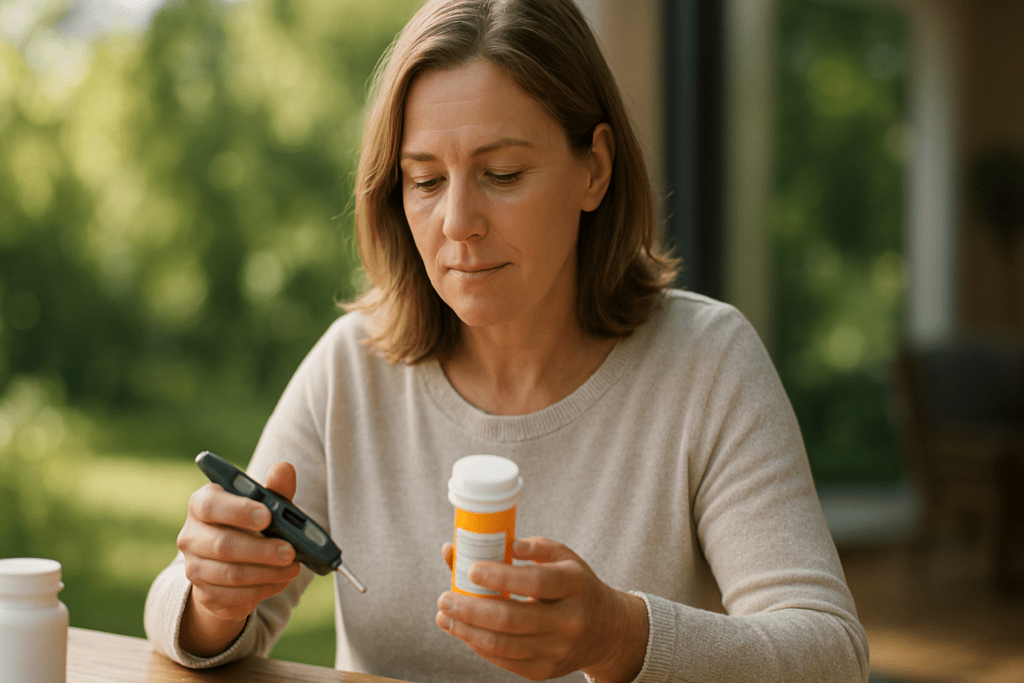Understanding the Growing Interest in Over-the-Counter Solutions for Diabetes
Diabetes, particularly type 2 diabetes, has become a global public health challenge, affecting hundreds of millions of people worldwide. As the prevalence of this chronic condition increases, so does the interest in new methods to manage it, especially outside traditional clinical settings. Among these approaches, over-the-counter (OTC) medicine to lower blood sugar has garnered attention for its convenience, accessibility, and affordability. People living with diabetes often seek nonprescription options that can supplement or potentially reduce their dependence on prescription drugs. This growing interest has prompted researchers to investigate whether OTC products can provide legitimate and safe alternatives or complements to conventional therapies.
You may also like: Breakthroughs in Current Diabetes Research: What the Latest Studies Reveal About Treatment and Prevention
While insulin and many antidiabetic medications require a prescription, several OTC compounds have been shown to influence blood sugar levels. These include dietary supplements, herbal remedies, and compounds initially developed for other health concerns but found to have glycemic effects. The broader trend reflects a desire for autonomy and holistic health approaches, where patients can actively participate in their care without relying exclusively on physician-prescribed pharmaceuticals. However, it’s essential to understand the science behind these alternatives before embracing them fully. As new findings emerge, the role of over-the-counter medicine to lower blood sugar is being reevaluated through the lens of evidence-based medicine and responsible patient education.
What Counts as Over-the-Counter for Diabetes? Clarifying the Category
In the context of diabetes, the term “over the counter” can encompass a wide array of products, some of which are regulated as drugs, others as dietary supplements, and still others as functional foods. Understanding this distinction is crucial, as the regulatory standards and evidence requirements vary significantly across these categories. Traditional OTC medications like aspirin or antihistamines are approved by the FDA for specific uses and sold without a prescription. However, most products marketed as over the counter for diabetes fall into less strictly regulated categories, which often include vitamins, minerals, botanicals, and nutraceuticals.
Supplements such as cinnamon, chromium, berberine, alpha-lipoic acid, and magnesium are commonly touted as natural blood sugar regulators. Each has different mechanisms of action, from improving insulin sensitivity to modulating glucose metabolism at the cellular level. Additionally, some OTC products originally designed for other conditions—such as fiber supplements for digestive health—may also help reduce postprandial glucose spikes. Yet despite the widespread availability of these products, the quality and consistency of evidence supporting their efficacy and safety can vary widely.
This ambiguity makes it vital for both consumers and healthcare providers to critically assess OTC options. A product labeled as an over-the-counter medicine to lower blood sugar does not necessarily imply clinically validated effects. Often, more research is needed to substantiate manufacturer claims, and consumers must be cautious about relying solely on anecdotal or preliminary data. Differentiating between evidence-based and speculative use is a cornerstone of safe and effective diabetes management.

Scientific Insights into Common Nonprescription Ingredients for Blood Sugar Control
Several natural compounds have emerged as promising candidates in the realm of nonprescription blood sugar management. Cinnamon, for example, contains bioactive components such as cinnamaldehyde and cinnamic acid, which have demonstrated insulin-mimetic properties in both in vitro and in vivo studies. Some clinical trials have found moderate reductions in fasting blood glucose and improved lipid profiles in patients using standardized cinnamon extracts. However, results are inconsistent across studies, and dosage variations contribute to this disparity.
Another frequently studied compound is berberine, an alkaloid found in plants like Berberis aristata and Coptis chinensis. Berberine has been shown to activate AMP-activated protein kinase (AMPK), a key regulator of energy metabolism. In several randomized controlled trials, berberine produced blood sugar-lowering effects comparable to metformin, albeit with varying tolerability. Despite its potential, concerns remain regarding bioavailability and gastrointestinal side effects.
Chromium picolinate is another widely available OTC supplement, often marketed for metabolic support. Chromium plays a role in carbohydrate and lipid metabolism, and its supplementation may enhance insulin sensitivity in some individuals. However, the evidence base is mixed, with some studies reporting modest benefits while others show negligible impact. Importantly, the effectiveness of chromium appears to depend on the individual’s baseline status and the form of chromium used.
Alpha-lipoic acid (ALA), a potent antioxidant, has been studied for its role in oxidative stress reduction and peripheral neuropathy in diabetes. In some trials, ALA supplementation was associated with improved insulin sensitivity and glucose uptake. Similarly, magnesium—an essential mineral involved in over 300 enzymatic reactions—has demonstrated favorable outcomes in individuals with type 2 diabetes, particularly those with underlying magnesium deficiency. These findings suggest that certain over-the-counter options for diabetes may serve as adjuncts to medical therapy when used appropriately and under supervision.
Evaluating Efficacy: What the Latest Studies Reveal
The growing body of literature on OTC interventions for diabetes includes both promising findings and cautionary tales. In recent years, randomized clinical trials and meta-analyses have provided more rigorous assessments of common nonprescription therapies. A 2021 meta-analysis published in Diabetes Research and Clinical Practice examined the effects of cinnamon supplementation in individuals with type 2 diabetes and prediabetes. The analysis concluded that cinnamon could lead to significant reductions in fasting glucose and HbA1c, although the heterogeneity among studies limited the strength of conclusions.
Berberine has also been the focus of high-quality research. A 2019 review in Frontiers in Pharmacology found that berberine consistently improved glycemic control across multiple trials, with some studies suggesting reductions in fasting plasma glucose of up to 30 mg/dL. Notably, berberine appeared particularly effective in newly diagnosed patients and those with metabolic syndrome, indicating its potential value as an early intervention tool.
For chromium, a Cochrane review highlighted the inconsistent effects across different trials, with more significant benefits seen in populations with chromium deficiency. This suggests that personalized approaches, possibly involving micronutrient testing, may be necessary to determine who benefits most from supplementation. Likewise, studies on magnesium and alpha-lipoic acid show beneficial effects primarily in populations with documented deficiencies or comorbidities like diabetic neuropathy.
The scientific landscape is evolving, and as more well-designed studies emerge, the evidence base for over-the-counter medicine to lower blood sugar continues to mature. Yet, despite these advancements, more long-term trials are needed to evaluate safety, adherence, and real-world outcomes, particularly when OTC options are used alongside standard antidiabetic therapies.
Risks, Limitations, and the Need for Professional Guidance
While the allure of accessible, nonprescription options is understandable, it’s essential to recognize the limitations and risks associated with unsupervised use. Many OTC products are not subject to the same rigorous testing and quality control as prescription medications. This can lead to issues such as batch variability, contamination, or inaccurate labeling. Moreover, interactions between OTC supplements and prescription drugs can be unpredictable, particularly in individuals taking insulin or sulfonylureas, where hypoglycemia is a serious concern.
Another concern is the reliance on anecdotal reports and marketing claims rather than clinically validated evidence. Patients may be misled into believing that a supplement is a substitute for medical care, leading to delays in treatment or poor glycemic control. The perception that “natural” equals “safe” can further contribute to a false sense of security. Even well-studied ingredients like berberine or ALA can have side effects or contraindications when taken in excess or without medical supervision.
Healthcare providers must remain informed about popular OTC trends to guide their patients safely. Integrative care models that incorporate evidence-based nonprescription strategies—alongside standard treatments—offer the most balanced and effective approach. This underscores the importance of shared decision-making and transparent communication between patients and providers when exploring over-the-counter medicine to lower blood sugar.

Consumer Trends and Market Dynamics in OTC Diabetes Products
The market for over-the-counter options for diabetes is expanding rapidly, fueled by consumer demand for autonomy, convenience, and cost-effective solutions. In the United States alone, the dietary supplements market exceeds $50 billion annually, with a significant portion attributed to metabolic health and blood sugar support. Retail shelves are increasingly populated with combination formulas promising glycemic balance, often blending botanicals, vitamins, and proprietary extracts.
This commercial enthusiasm reflects a larger trend toward self-directed health management, particularly among younger consumers and those without consistent access to healthcare. Online platforms, wellness influencers, and alternative health communities contribute to the rapid dissemination of product recommendations, sometimes without a strong foundation in scientific evidence. This can create a double-edged sword: while awareness and options are growing, so too is the risk of misinformation.
Transparency and regulatory oversight remain critical in this evolving landscape. Some companies voluntarily submit to third-party testing or adopt pharmaceutical-grade manufacturing practices, enhancing consumer trust. Others operate in regulatory grey zones, marketing products as “blood sugar support” supplements without providing specific claims that would trigger FDA scrutiny. As public interest in over-the-counter for diabetes grows, regulatory bodies may need to update guidance to ensure consumer safety and product consistency.
Integrative Approaches and Personalized Medicine in Diabetes Care
The future of diabetes management increasingly points toward personalized, integrative approaches that blend conventional medicine with individualized nonprescription strategies. Rather than viewing OTC options as either wholly effective or entirely ineffective, modern frameworks encourage nuanced assessments based on each patient’s unique needs, risk profile, and clinical context. This aligns with the principles of precision medicine, which aim to tailor interventions to genetic, environmental, and lifestyle factors.
In clinical practice, some endocrinologists and integrative physicians already incorporate select OTC supplements into patient care plans. For instance, berberine may be recommended for patients intolerant to metformin, while magnesium is sometimes prescribed for individuals with documented deficiency and poorly controlled diabetes. These strategies can be especially useful in bridging care gaps or enhancing quality of life, particularly when coordinated with medical supervision and lifestyle interventions.
Emerging technologies, including digital health apps and continuous glucose monitors, further support this integrative approach. Patients can track blood sugar trends in real time, enabling informed experimentation with diet, exercise, and OTC supplements under medical guidance. This creates a feedback loop that empowers patients and fosters collaborative care. As scientific literacy among consumers grows, the line between prescription and nonprescription diabetes care is becoming more fluid and personalized.
The Future of Nonprescription Diabetes Solutions: Where Research Is Headed
Ongoing research in the field of nonprescription therapies is poised to clarify the role of OTC interventions in diabetes care. One promising area is the exploration of combination supplements that integrate multiple evidence-based ingredients at clinically validated dosages. By targeting different pathways—such as insulin sensitivity, glucose absorption, and oxidative stress—these formulations may offer synergistic benefits. However, establishing efficacy and safety through robust clinical trials remains a prerequisite.
Scientists are also investigating novel compounds with blood sugar-lowering potential, including plant polyphenols, gut microbiota modulators, and peptides derived from food sources. Innovations in delivery systems, such as liposomal encapsulation and sustained-release tablets, aim to improve bioavailability and therapeutic outcomes. These advances could increase the reliability and convenience of over-the-counter medicine to lower blood sugar, making it a more viable option for mainstream use.
Furthermore, genetic and biomarker-driven research may enable more precise targeting of nonprescription therapies. For instance, individuals with specific metabolic profiles or gene variants could benefit more from certain supplements than others. Integrating these insights into clinical algorithms could optimize patient outcomes while reducing trial-and-error experimentation. As this research unfolds, collaboration between academic institutions, regulatory agencies, and supplement manufacturers will be crucial to ensuring ethical, evidence-based progress.

Frequently Asked Questions: Over-the-Counter Medicine to Lower Blood Sugar
1. Can over-the-counter products genuinely support long-term diabetes control, or are they only useful short-term?
Over-the-counter medicine to lower blood sugar can support long-term diabetes management when used strategically and in conjunction with other lifestyle interventions, but they are rarely standalone solutions. Products like berberine or alpha-lipoic acid may help regulate glucose metabolism over time, yet their sustained benefits depend on consistent use, appropriate dosing, and alignment with a patient’s individual needs. It’s also crucial to recognize that long-term blood sugar stability hinges on dietary habits, physical activity, sleep quality, and stress reduction. When patients use over-the-counter for diabetes alongside these pillars, outcomes can improve. However, regular monitoring and medical oversight remain essential to ensure efficacy and avoid complacency in disease management.
2. How do social and psychological factors influence the effectiveness of over-the-counter approaches?
The psychosocial environment surrounding an individual significantly affects how well they respond to over-the-counter medicine to lower blood sugar. For example, patients with strong health literacy and support systems are more likely to adhere to OTC regimens consistently and report side effects or inefficacies in a timely manner. On the other hand, those managing stress, depression, or isolation may misuse these products or expect unrealistic results. The belief in autonomy often drives interest in over-the-counter for diabetes, but without emotional and psychological stability, the results may falter. Addressing mental health and ensuring informed decision-making can make these OTC strategies much more effective.
3. Are there any promising innovations on the horizon for OTC diabetes treatments?
Yes, innovation in over-the-counter medicine to lower blood sugar is moving toward more targeted, bioavailable, and personalized solutions. New research is exploring nanoformulations that improve the absorption of plant-based compounds like curcumin and berberine, which historically have low bioavailability. Additionally, there’s increasing interest in microbiome-focused supplements that modulate gut health to indirectly improve glucose control. Future developments may involve AI-powered personalization tools that recommend the most effective over-the-counter for diabetes based on real-time health data and genetics. These advances could usher in a new era of OTC precision health for metabolic disorders.
4. Can OTC options help delay the progression from prediabetes to type 2 diabetes?
Over-the-counter for diabetes products may help slow the progression from prediabetes to full-blown type 2 diabetes, especially when used as part of a comprehensive preventive strategy. Supplements like chromium and magnesium have shown moderate effects in enhancing insulin sensitivity, which is critical during the prediabetic stage. Lifestyle changes remain the foundation, but integrating OTC support can help reinforce metabolic resilience in high-risk individuals. Clinical trials exploring early intervention with nonprescription products are still limited, but observational data suggest a possible benefit. Importantly, early engagement and education about these tools can empower at-risk populations before more invasive interventions are needed.
5. How do OTC blood sugar-lowering supplements interact with wearable tech like CGMs?
Pairing over-the-counter medicine to lower blood sugar with continuous glucose monitors (CGMs) offers a novel way to evaluate supplement effectiveness in real time. For example, individuals using CGMs can observe how their glucose responds to berberine or ALA across different meals and activity levels. This can create a personalized feedback loop, allowing for more informed dosing and timing. The synergy between wearables and OTC products also encourages greater accountability and engagement with metabolic health. As digital health tools become more integrated into daily life, this dynamic could redefine how people use over-the-counter for diabetes in a data-driven, customized way.
6. Are there any risks in combining multiple OTC supplements for blood sugar at once?
Yes, combining multiple over-the-counter medicine to lower blood sugar simultaneously can introduce both efficacy challenges and safety concerns. Some compounds may work synergistically, while others could have overlapping mechanisms or unintended interactions that increase side effects like gastrointestinal distress or hypoglycemia. Without proper guidance, users may inadvertently exceed safe dosages or create nutrient imbalances, particularly with minerals like magnesium or chromium. Additionally, many OTC products are not tested in combination during clinical trials, so their cumulative effects remain largely unknown. For anyone using over-the-counter for diabetes, it’s best to introduce one supplement at a time and track its effects carefully under medical supervision.
7. How does the global regulatory landscape affect the quality of OTC diabetes products?
The quality and consistency of over-the-counter for diabetes solutions vary greatly depending on where they’re manufactured and sold. In the United States, supplements are regulated as food products rather than drugs, which means they are not subject to pre-market efficacy testing. In contrast, countries like Germany have stricter guidelines for herbal preparations, sometimes requiring clinical evidence before products reach pharmacy shelves. These discrepancies mean that the same over-the-counter medicine to lower blood sugar can differ in purity, potency, and bioavailability across international markets. Consumers should prioritize brands that provide transparent sourcing, third-party lab testing, and clear dosing instructions regardless of country of origin.
8. What role does nutrient timing play when using OTC products for blood sugar control?
Timing matters when using over-the-counter medicine to lower blood sugar, particularly for supplements that influence glucose metabolism or insulin sensitivity. Taking certain supplements like berberine before meals can blunt postprandial glucose spikes, while others like magnesium may be more beneficial when taken at night due to their effect on stress and sleep. The interaction between circadian rhythm and metabolic pathways also plays a role; aligning OTC intake with natural hormonal cycles may enhance absorption and efficacy. Using over-the-counter for diabetes with an awareness of nutrient timing can improve outcomes and reduce variability in blood glucose responses. Personalized strategies often yield the most stable and meaningful improvements.
9. Can people without diabetes benefit from OTC blood sugar supplements?
Interestingly, over-the-counter for diabetes supplements are sometimes used by individuals without a formal diagnosis to enhance metabolic health or prevent future dysfunction. Athletes and biohackers, for instance, may take berberine or alpha-lipoic acid to optimize insulin sensitivity and mitochondrial function. While this off-label use isn’t inappropriate when guided by data and clinical insight, it’s not without risks. Over-supplementation can suppress normal glucose regulation or interfere with nutrient absorption over time. Anyone considering over-the-counter medicine to lower blood sugar preventatively should first consult a healthcare provider and ideally use tools like CGMs to assess real physiological impact.
10. What long-term strategies enhance the sustainability of OTC diabetes interventions?
To make over-the-counter medicine to lower blood sugar part of a sustainable health strategy, users must embed it within a broader lifestyle and mindset shift. Regular lab testing, symptom tracking, and clinical check-ins help adjust the approach over time and catch any adverse trends early. Education is equally vital—those who understand the mechanisms of action are more likely to use OTC products appropriately and consistently. Community support, whether in person or online, can reinforce habits and promote accountability. When over-the-counter for diabetes options are approached as tools—rather than miracle cures—they become powerful adjuncts in the long-term management and prevention of metabolic disease.
Conclusion: A Balanced Look at Over-the-Counter Medicine to Lower Blood Sugar
The emergence of over-the-counter medicine to lower blood sugar reflects both the evolution of diabetes care and the broader shift toward patient empowerment in health decision-making. While prescription medications remain the cornerstone of treatment for many individuals, nonprescription options—when grounded in science—can play a valuable adjunctive role. Whether it’s cinnamon, berberine, magnesium, or another compound, these agents must be used thoughtfully, with an understanding of their benefits, limitations, and potential risks.
For patients exploring over-the-counter for diabetes solutions, the key lies in evidence-based discernment and collaborative care. Healthcare professionals have a vital role in guiding their patients through the complexities of supplement use, ensuring that OTC strategies enhance rather than undermine clinical management. Meanwhile, ongoing research continues to refine our understanding of which nonprescription therapies truly deliver on their promise.
In a world where chronic diseases demand long-term commitment and individualized approaches, the integration of safe, effective, and accessible OTC options offers a hopeful direction. By prioritizing transparency, scientific rigor, and patient education, we can ensure that over-the-counter medicine to lower blood sugar becomes a trustworthy ally in the ongoing fight against diabetes.
natural remedies for high blood sugar, supplements for insulin sensitivity, diabetes prevention strategies, nonprescription glucose control, holistic diabetes care, managing type 2 diabetes naturally, blood sugar lowering herbs, metabolic health supplements, insulin resistance support, diabetes-friendly lifestyle, functional medicine for diabetes, glycemic control without medication, integrative diabetes treatments, alternative diabetes therapies, natural blood sugar stabilizers, nutrition and blood sugar, herbal support for glucose levels, glucose regulation supplements, diabetes and micronutrient therapy, evidence-based supplement use
Further Reading:
What Are the Best Drugs to Treat Diabetes?
What is the link between diabetes and diarrhea?
Why Non-Diabetics Are Using Continuous Glucose Monitors?
Disclaimer
The information contained in this article is provided for general informational purposes only and is not intended to serve as medical, legal, or professional advice. While MedNewsPedia strives to present accurate, up-to-date, and reliable content, no warranty or guarantee, expressed or implied, is made regarding the completeness, accuracy, or adequacy of the information provided. Readers are strongly advised to seek the guidance of a qualified healthcare provider or other relevant professionals before acting on any information contained in this article. MedNewsPedia, its authors, editors, and contributors expressly disclaim any liability for any damages, losses, or consequences arising directly or indirectly from the use, interpretation, or reliance on any information presented herein. The views and opinions expressed in this article are those of the author(s) and do not necessarily reflect the official policies or positions of MedNewsPedia.


